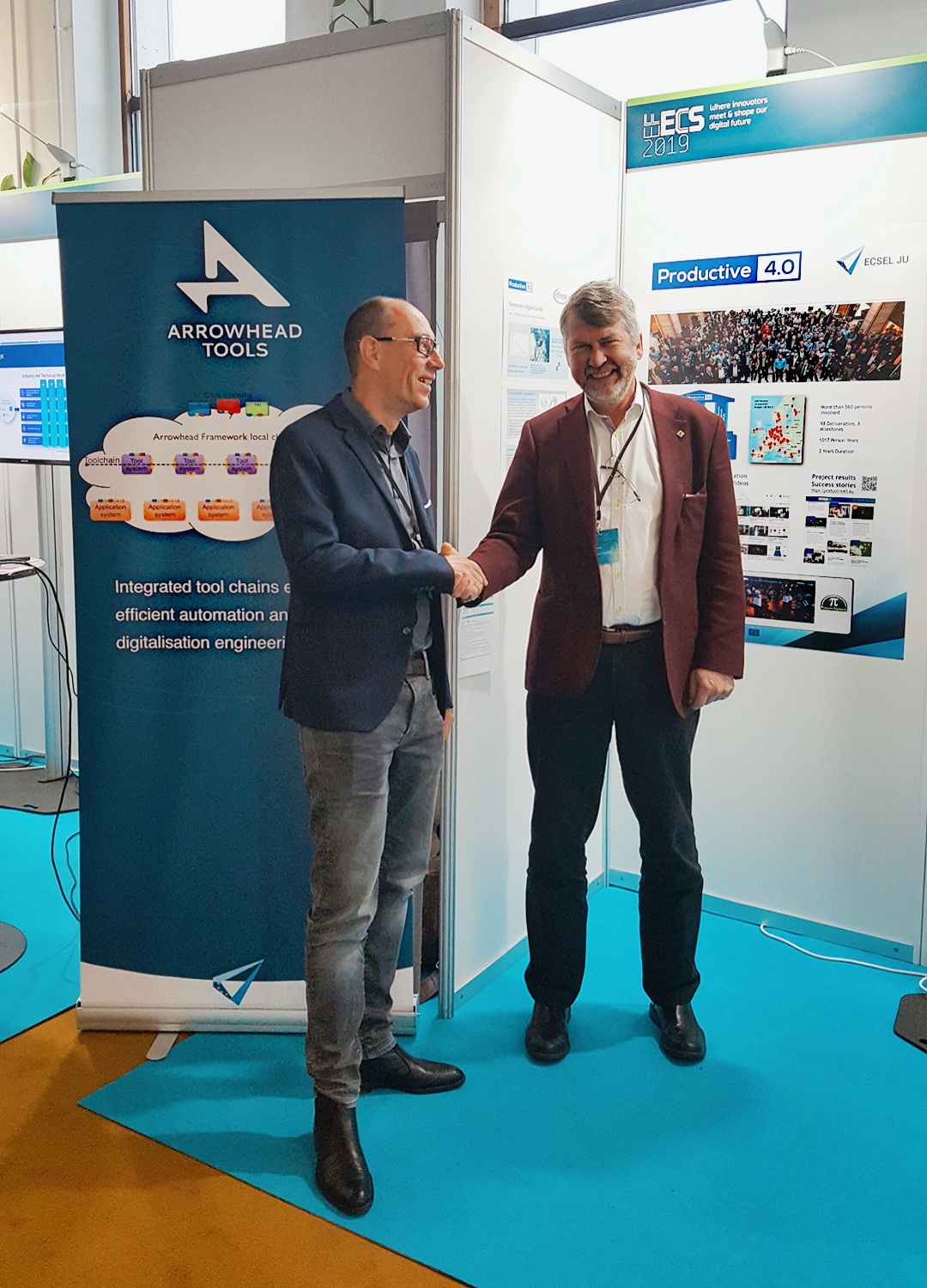
Passing on the fire – let the lighthouse shine
European funded projects are not meant to be closed shops. With the overarching goal of strengthening the industry in Europe, innovative approaches, successful results or unexpected challenges must be shared with other projects. Only through knowledge transfer findings can further develop their potentials on the next level and in a different context. This applies even more to Lighthouse projects; in order to signpost specific subjects of common European interest the concept was introduced by ECSEL JU in 2017.
That same year and soon after its kick-off in April, Productive4.0 was the first to be elected as Lighthouse Initiative, dedicated to sharing visions and strategies, setting future directions and encouraging collaborative projects. The most prominent example is the close collaboration with Arrowhead Tools. The project started two years later, and, behind Productive4.0, it is the second largest in Europe counting 80 partners and a total budget of 90 million Euros.
Joint workshop of the largest ESCEL projects
Arrowhead Tools focuses on making digitalisation even more efficient and easy to handle aiming at a considerable reduction of engineering costs. Even though it is still waiting to become member of the Lighthouse Industry4.E family, the two largest ECSEL projects met for a Joint Productive4.0 & Arrowhead Tools Workshop just a week before the official European Forum for Electronic Components and Systems (EFECS) last November. It was a four day session full of intense and detailed exchange, analysing and roadmapping on the premises of the University of Porto in Portugal.
The reason for such an intense collaboration is evident: “Arrowhead plays a major role as a framework, much like the backbone of our project,” Productive4.0 coordinator Thomas Gutt says. “Roughly half of our industrial use cases rely on it, so we see a big technology sharing with Arrowhead Tools where the Arrowhead Framework is the core subject directly implemented in all use cases.”
The strong relations between the projects are represented in person by Jerker Delsing from Swedish Luleå University of Technology (LTU). The Arrowhead Tools coordinator is also responsible for the system architecture in Productive4.0’s work package1 which interacts with all other work packages in the project.
Transparent flow of technology
Working on a decentralised system with a strong focus on interoperability Delsing’s activities date back to 18 years ago: “The first project on service oriented architectures was called Sofia, followed by Socrates and two other projects. And then came the Arrowhead project looking at a wide scale interoperability and integrabilitiy of IoT to form automation SoS. This is also where we started to have a common code base for a number of core components which is now called the Arrowhead Framework,” Delsing says.
Resources to further develop its basics are provided by Productive4.0 which is a benefit – also to other projects that are involved in the development. There is a transparent flow of technology in between projects with all of them contributing to the framework.
Pointing out the difference between Productive4.0 and Arrowhead Tools, Delsing explains: “Even though there is quite an overlap it is not duplicated by Arrowhead Tools where we are rather looking at necessary improvements. One aspect is training professionals with the new technology. Another core part is tools to be able to engineer solutions. With Productive4.0, the key is optimised supply chain management covering the entire product life cycle. With Arrowhead Tools instead, we are going beyond single use cases, looking at how it can be done for thousands of commercial installations later on”.
Close teamwork as a role model
The basis for the fruitful collaboration is the fact that all of the technology is open source, so there is no need to be concerned about violating intellectual property rights. During the joint workshop in Porto, the free and creative spirit turned out to be a real boost for the 150 researchers and developers with their different views and backgrounds to get to the point. Taking into consideration that it normally takes about one and a half years before in a project things really get going, it made Arrowhead Tools to be way ahead of time.
What counts is an efficient knowledge transfer not only to running projects but also to those succeeding. With a rising maturity level expected results can be achieved a lot earlier. On top it helps speeding up establishing a wide industrial support for certain technology directions which is the way to create de facto standards. As to the Arrowhead Framework, the open source system is gaining more and more followers. While in the projects it still has to be further developed, in the future, it may become a leading European framework.
All in all, the close teamwork between Productive4.0 and Arrowhead Tools can be seen as a role model. Looking at the big picture, it therefore becomes clear that even a huge and ambitious project like Productive4.0 is only one guiding light in a row of others to come. It has to pass on its fire to make them shine and lead the way to new digital shores.


